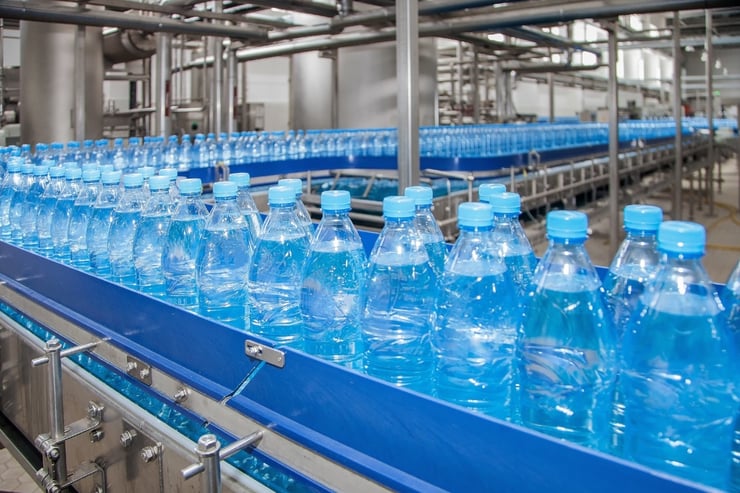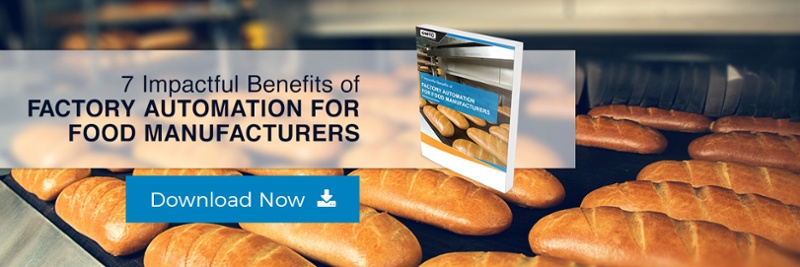December 5, 2017 | Food and Beverage
How Factory Automation Can Help Beverage Manufacturing Enjoy Sweet Success

Today’s beverage manufacturers face many challenges: striving to meet the rapidly-changing demands of consumers and retailers, government regulations, efficiency, and expansion. Many beverage manufacturing companies also struggle with issues like supplier-to-customer supply chain traceability, inventory accuracy, and compliance. These issues can make it challenging for a beverage manufacturing company to focus on your core competency: to produce quality beverage products.
When outdated tools and processes are hampering productivity and limiting your revenue, it is time for the digital transformation of your factory floor. To stay competitive, small and medium-sized beverage manufacturing companies may need to update their factory automation to transform their plants. Online sensors, robotics, computer vision systems, and other automated processing systems automatically connect key manufacturing components -- everything from the raw materials and ingredients, to processing, to packaging, to distribution, and to delivery to the customer on time.
Manufacturers anticipate an increase in the use of robotics and automation, according to the 2017 Trends in Food Processing Operations research report by PMMI, The Association for Packaging and Processing Technologies. Nearly half of the interview participants for the report said they expect to increase capital equipment spending to improve automation over the next two years.
We have compiled a list of reasons why gaining real-time visibility in every step of the production cycle may help you to understand how your business and manufacturing processes may be automated to achieve greater benefits on a larger scale.
Consistent and Dependable Quality
When beverage processing and packaging systems are automated, operators gain greater control over quality. Equipment performance may be easily monitored to ensure that they are working according to established performance parameters to maintain consistent quality for all your products. Human visual inspection is prone to inconsistencies that may be avoided by using computer vision systems. By employing automation, production consistency is taken out of human hands and placed in the more precise automation arena.
Improved Efficiency, Agility, Productivity, and Profitability
Productivity is directly related to efficiency in that the quantity of products manufactured greatly depends on how efficiently input resources are used. Automation helps to pinpoint areas that require greater or lesser resource allocation, such as how much raw materials and ingredients should go into a mixture, what equipment to use, and making sure that the right staff is assigned to the job. With efficiency leading to productivity, profitability and the potential for growth naturally follow.
According to respondents in the PMMI report, beverage manufacturers want "machines that give us the flexibility to be more agile in the production process and allow us to be more reactive to retail changes in real time."
Systematic Traceability
This setup allows manufacturers to keep track of vital product information from points of origin to points of sale or consumption. At any point and time before, during, and after the production cycle, managers are able to determine who the suppliers of raw materials are, what machines are required, and what processes need to be performed. When everything about a product can be traced, operators can access a product’s history from farm to factory, which is especially important when complaints about the product arise or there are concerns about compliance or legal liability.
Improved Product Safety
The U.S. Food and Drug Administration (FDA) is calling for more rigorous enforcement of sanitation and product safety laws in the processing, preparation, packaging, storage, and distribution of food and drinks.
Humans working in factory floors may unknowingly expose hair, nails, or body fluids to ingredients or preparation tools that can potentially cause food borne illnesses. When properly cleaned and maintained, robots are typically resistant to bacterial growth. They also are impervious to high pressure wash downs and caustic cleaning chemicals. They often are designed with advanced sealing systems with no seams where pathogens can hide.
Enhancement of a Brand's Reputation
Consistent quality, product safety, and systematized traceability all contribute to a beverage manufacturing company’s key objective – a good brand reputation. Simple errors can cause product recalls that often have a catastrophic effect on a brand’s reputation. For instance, labeling and packaging errors can result in premature spoiling, contamination, improper storage after opening, or consumer allergic reactions after ingestion. Thanks to automation, these crucial factors are handled to maintain good consumer delight in your products.
Factory automation in beverage manufacturing allows SMMs to enjoy the sweet taste of success through smart business practices and enhanced compliance adherence. The food and beverage industry is wrought with rules and regulations which, when not followed, may create issues for manufacturers.

